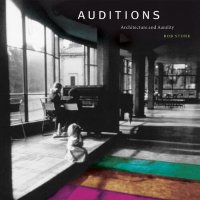
A radical rethinking of architectural space in terms of its acoustic dimensions, exploring aural-architecture moments ranging from silent cinema to the sound of water.
In Auditions, Rob Stone proposes a new and transformative view of architecture and sound. He offers a radical rethinking of the inhabitation of architectural space in terms of its acoustic dimensions, presenting a concept of aurality as an active, speculative, yet conditional understanding of the complexity of social spaces. The aural architectures he discusses are assembled from elements of architecture and music--including works by Ludwig Mies van der Rohe and John Cage--but also from imagined spaces and other kinds of less obviously musical sounds.
Stone presents a series of aural-architecture moments, each of which brings architectural space into conversational relationships with extra-architectural concepts and perceptions, often suggested by other art forms and social practices. He considers, for example, the acoustic themes of a silent movie; Greg Louganis's failed dive at the Seoul Olympics and the moral values attached to water in architecture; the custodianship of high culture at a second-hand classical record shop in London; and hair (as in the conductor's hairstyle) as a mediating form between music and architectural space.
In Auditions, Stone brings together and revises the canonical instances of sound's relationships with architectural spaces, and he does so by granting new kinds of spatial agency to sound. Sound is not only a portal into otherwise imperceptible aspects of architecture but also a reflection on the concepts that produce our expectations of architecture.
In Auditions, Rob Stone proposes a new and transformative view of architecture and sound. He offers a radical rethinking of the inhabitation of architectural space in terms of its acoustic dimensions, presenting a concept of aurality as an active, speculative, yet conditional understanding of the complexity of social spaces. The aural architectures he discusses are assembled from elements of architecture and music--including works by Ludwig Mies van der Rohe and John Cage--but also from imagined spaces and other kinds of less obviously musical sounds.
Stone presents a series of aural-architecture moments, each of which brings architectural space into conversational relationships with extra-architectural concepts and perceptions, often suggested by other art forms and social practices. He considers, for example, the acoustic themes of a silent movie; Greg Louganis's failed dive at the Seoul Olympics and the moral values attached to water in architecture; the custodianship of high culture at a second-hand classical record shop in London; and hair (as in the conductor's hairstyle) as a mediating form between music and architectural space.
In Auditions, Stone brings together and revises the canonical instances of sound's relationships with architectural spaces, and he does so by granting new kinds of spatial agency to sound. Sound is not only a portal into otherwise imperceptible aspects of architecture but also a reflection on the concepts that produce our expectations of architecture.
Download the book Auditions: Architecture and Aurality for free or read online
Continue reading on any device:

Last viewed books
Related books
{related-news}
Comments (0)